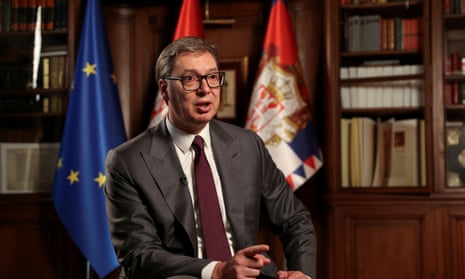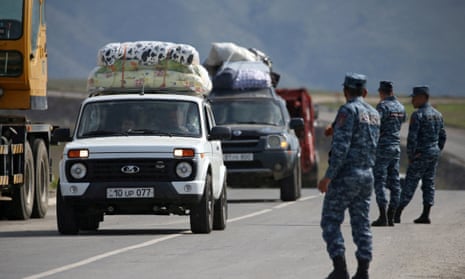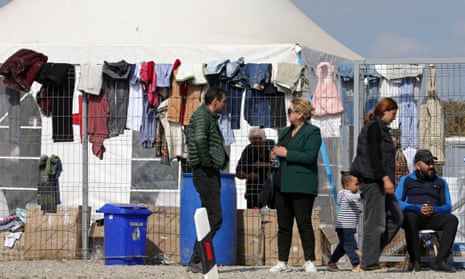Kosovo deputy prime minister says incident on 24 September was ‘open act of aggression’ and says it represents risk to entire region. This live blog is closed.
Tue 3 Oct 2023 18.37 CESTFirst published on Tue 3 Oct 2023 11.12 CEST
— Catherine Colonna (@MinColonna) October 3, 2023

Julian Borger
The signs over the weekend suggested that the immediate crisis over Kosovo has been defused.
Some Serbian troops are pulling back from the border, and the threat of a return to armed conflict has receded for now.
The Biden administration acted decisively on Friday, drawing on some of the lessons from the run-up to the Ukraine invasion, going public with US intelligence on Serbian troop movements, and calling Belgrade to threaten sanctions and ostracism. The Nato peacekeeping force, Kfor, was immediately reinforced by the transfer of command of a battalion of British troops who were in the region for training.
While the immediate danger may have passed, however, the chronic crisis over Kosovo continues to fester.
The events of the past week could be an inflection point, depending on whether they lead to a policy rethink in Washington and Brussels.
Read the full story here.

The Serbian president, Aleksandar Vučić, speaks during an interview with Reuters in Belgrade, Serbia, on 28 September.
Photograph: Zorana Jevtić/Reuters
Eyes on an international mission
Asked about the UN mission in Nagorno-Karabakh, a spokesperson for the US state department said yesterday that “we welcome that mission” and “we continue to work with our allies and partners about what a more long-term mission ought to look like”.
“Around 100,000 ethnic Armenians have left Nagorno-Karabakh, and relocated to Armenia. We believe that they ought – if they wish to return, they ought to have their rights respected, and that there ought to be an international monitoring mission in place to secure that,” the spokesperson said.
Only a few hundred people remain in the capital of Nagorno-Karabakh, the International Committee of the Red Cross (ICRC) team lead, Marco Succi, said today, Reuters reported.
“The city is now completely deserted,” he said via video link from the Karabakh capital.
“The hospitals … are not functioning; the medical personnel left; the water board authorities left; the director of the morgue also left. So this scenario is quite surreal,” he said.

Refugees from Nagorno-Karabakh arrive in the border village of Kornidzor, Armenia, on 29 September.
Photograph: Irakli Gedenidze/Reuters
French minister heads to Armenia
France’s foreign minister, Catherine Colonna, is visiting Armenia today, where she is expected to meet the prime minister, Nikol Pashinyan, and foreign minister, Ararat Mirzoyan, as well as refugees who fled Nagorno-Karabakh.
Ahead of the trip, the French foreign ministry said Colonna would underline France’s support for Armenia’s territorial integrity.
Armenia’s national assembly has ratified the founding statute of the international criminal court.
Russia had previously called the idea “extremely hostile”.

Pjotr Sauer
Nearly the entire ethnic Armenian population has left Nagorno-Karabakh, as the first United Nations mission arrived in the largely deserted mountainous region on Sunday.
Stéphane Dujarric, the spokesperson for the UN secretary general, said its team on the ground, the first UN mission to the region in 30 years, would “identify the humanitarian needs” both for people remaining and “the people that are on the move”.
Many of the Armenians who fled Nagorno-Karabkah said they felt the international mission’s visit came too late, after Azerbaijan reclaimed the area in a lightning military operation last month.
Sitting on a bench near the central Republic Square in the Armenian capital, Yerevan, Aren Harutyunyan, who left the region known by Armenians as Artsakh last week, blamed the “international community” for the exodus.
“What is there left for the UN to monitor?” said Harutyunyan, 53, who arrived in Yerevan on Friday after a gruelling three-day journey from Stepanakert, the Nagorno-Karabakh capital.
“No one is there any more, everyone is gone, it’s a ghost town.”
Read the full story here.

People gather near an aid centre for refugees from the Nagorno-Karabakh region in the border village of Kornidzor, Armenia, on 29 September.
Photograph: Irakli Gedenidze/Reuters
Berlin wants international observers to stay in Nagorno-Karabakh to help build “trust” for civilians.
“It is a positive step that Azerbaijan has allowed UN observers into Nagorno-Karabakh for the first time,” the German foreign office said today.
“They need a permanent presence, as only transparency can build trust in Azerbaijan’s promise to protect the rights of all residents and returnees to the region,” it added.

An Azeri serviceman stands at a former Armenian separatists military position in the village of Mukhtar (Muxtar) retaken recently by Azeri troops, during an Azeri government-organised media trip in Azerbaijan’s controlled region of Nagorno-Karabakh on Tuesday.
Photograph: Emmanuel Dunand/AFP/Getty Images
Good morning and welcome back to the Europe live blog.
Today we will be looking at the latest on two crises that have raised concern across Europe: the situation around Nagorno-Karabakh and tensions between Kosovo and Serbia.
The European parliament is set to debate both issues later today.
Send your comments to lili.bayer@theguardian.com.
